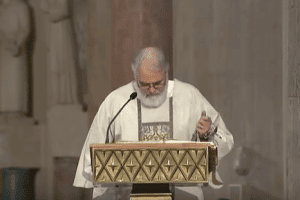
Catholic dioceses should handle allegations State law enforcement officials and New Jersey’s bishops have approved guidelines spelling out how the state’s five Roman Catholic dioceses should handle allegations of sex crimes. The seven-page “memorandum of understanding,” which officials hailed as the first of its kind in the nation, was released Monday as a response to […]

Catholic dioceses should handle allegations State law enforcement officials and New Jersey’s bishops have approved guidelines spelling out how the state’s five Roman Catholic dioceses should handle allegations of sex crimes.
The seven-page “memorandum of understanding,” which officials hailed as the first of its kind in the nation, was released Monday as a response to the church abuse scandal.
“This is the first such agreement that I know of where you have all dioceses and prosecutors working from the same page,” said John Hagerty, a spokesman for the state Division of Criminal Justice, which helped broker the agreement between the bishops and the state’s 21 county prosecutors.
The document adds nothing new to state law, which already requires every resident to report suspected child abuse to the state Division of Youth and Family Services.
But it does create a uniform procedure for church employees, and communicates one simple but crucial message: Investigating child abuse is a job for public authorities, not the church.
“The parties … recognize that it is ultimately the responsibility of the prosecutor to decide when and how to conduct a criminal investigation,” the memorandum says.
The church scandal exploded this year amid revelations that the Archdiocese of Boston quietly handled accusations against priests by paying out large settlements to the victims, and shifting the priests to other assignments.
The nation’s bishops responded by requiring the removal of a priest from ministerial roles if an accusation of child abuse is substantiated.
But victims’ groups and others say a key challenge still lingers: Ensuring that dioceses report all accusations even ones that go back decades to authorities.
The new guidelines, officials say, do just that by including all suspected sex offenses – past, present, and future. They also are not limited only to cases involving minors.
The guidelines also emphasize the need for strong communication between the dioceses and authorities, calling for some church workers to act as contact persons with law enforcement.
Hagerty said each diocese, though trying to comply with the law, has handled accusations according to its own administrative policies. In the spring, for example, the Diocese of Paterson publicly identified accused priests, while the Archdiocese of Newark kept the priests’ names confidential. The guidelines call for the dioceses to protect the identity of both the accuser and the accused.
“There was an absolute need to consolidate the approaches of seven different dioceses, to make sure there is no difference in handling an investigation between, say, the Archdiocese of Newark and the Camden Diocese,” Hagerty said.
He said the state will use the guidelines as a model to work with other religious and non-profit groups that deal with children.
The document doesn’t carry the force of law, and no penalties exist for those who violate the agreement.
But Catholic officials say they’re committed to making sure the guidelines become standard policy among all church employees, from diocesan administrators to parish secretaries.
“The way I see it, this is a codification in a uniform way of what we’ve been doing all along,” said William F. Bolan Jr., the executive director of the New Jersey Catholic Conference, which helped to draw up the agreement.
Members of one prominent victims group say the document doesn’t go far enough. They say they want state officials to convene a grand jury to investigate the bishops’ handling of abuse cases.
“The agreement does not go much beyond the bishops proclaiming, ‘We will finally obey the laws of New Jersey,” said Matt Kelly, a spokesman for the New Jersey chapter of Survivors’ Network of Those Abused by Priests.
The guidelines call for the dioceses to take action as soon as someone comes forward with an accusation. The diocesan employee must immediately turn over the allegation to a designated co-worker or supervisor, who must then promptly notify a county prosecutor. If the alleged abuse is still occurring, the employee must immediately contact the prosecutor. The guidelines also apply to two Eastern Catholic dioceses in New Jersey.
The document was drafted by prosecutors, lawyers representing the dioceses, and the staff of the Catholic Conference. The two sides began meeting last spring at the urging of the prosecutors. “Last spring was the high point of the allegations involving sexual assaults nationwide, that brought to the fore the need for a standard set of guidelines,” Hagerty said.
The personal injury attorneys at Parker Waichman LLP offer free, no-obligation case evaluations. For more information, fill out our online contact form or call 1-800-YOURLAWYER (1-800-968-7529).


